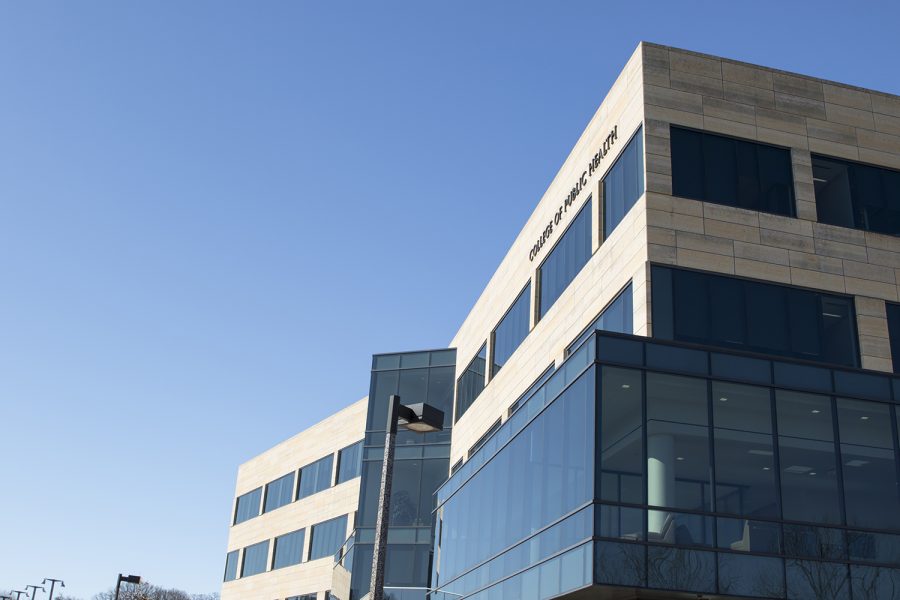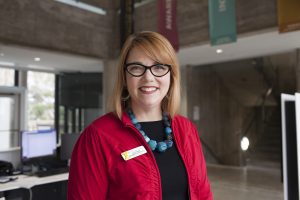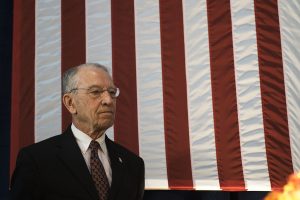UI College of Public Health dean leads collaborative workshop between U.S., India
The Advancing Environmental Health Science Research and Translation in India through Community Based Participatory Research Workshop took place in New Delhi, India at the end of February. The UI College of Public Health’s Dean Edith Parker and assistant research scientist Nicole Novak were at the center of its organization and presentation.
The College of Public Health is seen on March 11, 2019.
April 2, 2019
Researchers in the U.S. and India have a common goal: using participatory research to study and understand the health impacts of things like pesticides, air pollution, and natural disasters.
The University of Iowa College of Public Health, Participatory Research in Asia, and India collaborated for the Advancing Environmental Health Science Research and Translation in India through Community Based Participatory Research Workshop in New Delhi, India. The workshop, which was held in late February, was the first of its kind.
There were months of preparation between parties in both India and Iowa City, assistant research scientist Nicole Novak said. Novak was brought on when she was a postdoctoral fellow by UI College of Public Health Dean Edith Parker to assist with workshop efforts.
Parker had been in contact with Banalata Sen, an environmental health consultant, and she had committed to doing the workshop before taking on the role as dean of the UI College of Public Health, Parker said. Sen had a large hand in organizing efforts between the U.S. and India for the workshop. In addition, Sen assisted in writing a grant.
“Collaborations between the two countries will enable the exchange of knowledge to evolve methods, technology, and tools to address the increasing environmental burden of disease among the most vulnerable in both parts of the world and beyond,” Sen said in an email to *The Daily Iowan*.
RELATED: College of Public Health builds healthy eating habits in rural schools
Since the summer of 2018, video conference calls took place once a week across the world from each other. Here in Iowa City, they occurred early in the day, and in India, for PRIA’s founder and president Rajesh Tandon and others, it was the end of the day. Being nearly 12 hours apart was a challenge on the communication front, Parker said, but it all worked out in the end.
Community based participatory research involves the community members in the study as equals, rather than looking at them as subjects, Novak said. Scientists who aren’t directly affected by issues they study sometimes don’t fully understand the context of the problem. The CBPR method is used to understand fully the barriers that may be changing the problem, she said.
“When you work closely with people in the community, they will have a lot more creative and effective ideas of how to fix things. It requires humility, time, and trust,” Novak said.
RELATED: Tippie graduate dubbed 2018 Global Citizen of the Year Award finalist
The workshop invited participatory researchers from both the U.S. and India to collaborate for three days, learn from each other, and brainstorm ways to combat serious health concerns due to environmental exposures, Parker said. Overall, the workshop exceeded her expectations.
“We introduced people to a new type of research and allowed people to ask questions about their research. I am very confident that we will see some really good partnerships,” Parker said.
While this workshop is unlikely to repeat, Parker and Novak are confident this led to collaborations that will pave the way for global participatory research at large.
“We are really thinking about potential areas of collaboration in the future. [Tandon] and I have talked about ways that we can find funding sources to do more capacity building around this area,” Parker said. “I think that even if future collaborations weren’t to happen, [the workshop] would still be a success.”






